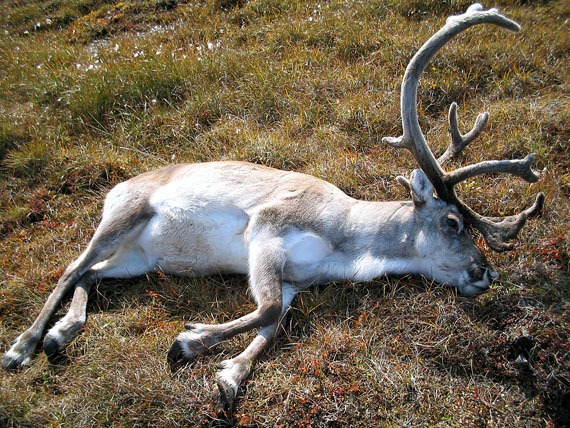Constitutional fight brewing over Nunavut caribou harvest
A constitutional showdown over Inuit rights is brewing in the Nunavut Court of Justice in Iqaluit as lawyers debate the actions of an Inuk Canadian Ranger who harvested a Baffin Island caribou during a territorial government-imposed moratorium in 2015.
Michael Irngaut, a beneficiary of the Nunavut Land Claims Agreement from Igloolik, is charged with two counts under Nunavut’s Wildlife Act for allegedly shooting and harvesting a caribou on Baffin Island while en route to Mary River, during a Canadian Ranger patrol on Feb. 15, 2015.

At the time, a Government of Nunavut-imposed moratorium restricting all harvesting of Baffin Island caribou had been in place for nearly two months.
Lawyer Stephanie Boydell told Justice Neil Sharkey on Aug. 15 that a constitutional challenge over the application of penalties on Irngaut’s alleged actions may be launched, and Irngaut’s legal team has already contacted out-of-territory consultants with experience in constitutional law.
“We did have some consultation with outside counsel that are very familiar in this area of the law,” Boydell said at the Nunavut Court of Justice.
If the case were to go forward with constitutional arguments, its decision could be an important precedent for Nunavut land claims beneficiaries, who have specific hunting rights defined under the NLCA—a treaty protected by Section 35 of of the constitution.
Individuals convicted under the Nunavut Wildlife Act can be charged fines of up to $500,000, sentenced to six months in jail, or both.
Under section 5.7.27 of the NLCA, “an Inuk with proper identification may harvest up to his or her adjusted basic needs level without any form of license or permit and without imposition of any form of tax or fee.”
But under the same section of the NLCA, the act also recognizes that “the wildlife management system and the exercise of Inuit harvesting rights are governed by and subject to the principles of conservation.”
The NLCA also acknowledges that the government holds the ultimate responsibility for wildlife management, as well as the need for an “effective role” for Inuit in all aspects of wildlife management.
The Government of Nunavut imposed a harvesting ban on Baffin Island caribou on Jan. 1, 2015, following reports that the island’s caribou population had diminished by a whopping 95 per cent from the 150,000 caribou recorded in the 1980s.
That ban was lifted seven months later in August 2015 and replaced with a minimal annual quotaof 250 male caribou.
While Inuit bodies such as Nunavut Tunngavik Inc. and the Qikiqtaaluk Wildlife Board opposed the ban, they supported the limited quota system.
Sharkey advised lawyers appearing for the case that the nature of Irngaut’s argument may require subpoenas for government documents related to the moratorium’s creation.
The court would then have to determine the applicability of those documents in separate “voir dire” hearings, if lawyers decide to present the evidence in a trial.
“Nobody is disputing the facts leading up to this [case], it’s just if it will come down to being a constitutional challenge to the legislation itself,” Boydell said.
According to an agreed statements of facts already filed with the court, Irngaut shot a male caribou near Neergaard Lake on Baffin Island and ate “much of the caribou” with his travelling companions as they made their way to Mary River on a Canadian Rangers assignment.
Irngaut kept the caribou’s hide, eventually giving it to the local Igloolik conservation officer and reporting the harvest when he returned from his patrol.
The same conversation officer charged Irngaut a few months later under sections 69 and 85(1) and (2) of Nunavut’s Wildlife Act for harvesting an animal contrary to regulation and for possessing an unlawfully harvested pelt.
Sharkey adjourned proceedings until Sept. 11, when lawyers will meet again in assignment court to provide a judge with an update on deliberations.